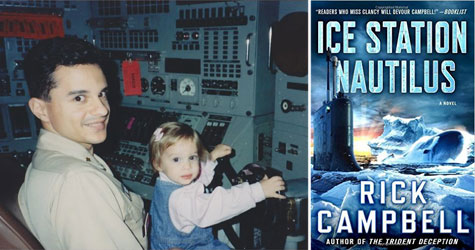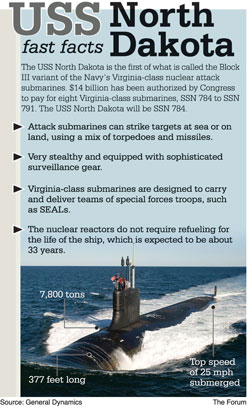
Rick Campbell, author of Ice Station Nautilus, spent more than 20 years on multiple submarine tours. Now, he writes submarine-based military thrillers.
Rick was kind enough to take some time from his busy schedule to answer some of CrimeHQ's questions about submarines, how they navigate, and how his experiences influence his novels.
Your new book takes place in the Arctic. How does the cold and remoteness influence Ice Station Nautilus?
 Most of the scenes in Ice Station Nautilus occur atop the polar ice cap or the Barents Sea below it, so the frigid and remote environment play an influential role in the storyline. For example, submarine operations beneath the ice are notably different than anywhere else in the world. The most significant danger is not running aground due to traveling too deep, but of hitting an iceberg or ice keel due to being too shallow.
Most of the scenes in Ice Station Nautilus occur atop the polar ice cap or the Barents Sea below it, so the frigid and remote environment play an influential role in the storyline. For example, submarine operations beneath the ice are notably different than anywhere else in the world. The most significant danger is not running aground due to traveling too deep, but of hitting an iceberg or ice keel due to being too shallow.
That poses a problem—submarines normally travel underwater using only their charts and their inertial navigators (they don’t use active sonar, only passive), and although icebergs give off a fizzing sound as they melt, you can’t determine how deep the iceberg goes, nor can a submarine detect the silent ice keels beneath the polar ice cap, which can drop down almost two hundred feet. To identify icebergs and ice keels, submarines traveling in the Marginal Ice Zone and under the ice normally use their forward-looking active under-ice sonar, but that poses a problem when they engage in combat, as they need to go silent.
Additionally, submarines typically go to periscope depth, periodically, to obtain a satellite position fix for their inertial navigators and to download the latest radio messages and transmit outgoing ones. Under the ice, it’s not so easy to surface, as submarines can break through thin ice only (a few feet thick).
As a result, submarines under the ice constantly track the depth of the ice they’re under (using upward-looking topsounders), documenting the location of ice thin enough to break through, and also looking for leads and polynas, which are small open spaces between the ice floes. So the normal operational routine is very different when traveling under the ice, and engaging in combat is even more perilous, due to the inability to detect ice keels.
Atop the ice, the frigid and remote environment plays a significant role, as there is no civilization for hundreds of miles and no infrastructure to tap into. A self-sufficient ice station has to be established, and in the case of Ice Station Nautilus, it has to be established very quickly, due to the requirement to locate the sunken submarines and rescue their crews trapped below the ice.
The remote location plays a role once the Russians decide to employ one of their polar Spetznaz brigades, as there is no one nearby to assist Ice Station Nautilus. (Except two platoons of U.S. Navy SEALs aboard a submarine surging toward the ice station.) Due to the polar ice cap, I was able to have events occurring simultaneously both atop and below the ice, increasing the pace and tension, which are crucial elements of a good thriller.
 In your book, America's new fast-attack submarine is named North Dakota and Russia's new ballistic-missile submarine is named Yury Dolgoruky. What was the inspiration behind these names?
In your book, America's new fast-attack submarine is named North Dakota and Russia's new ballistic-missile submarine is named Yury Dolgoruky. What was the inspiration behind these names?
I try to make my books as realistic as possible, and I use real submarines in the stories. The plot of Ice Station Nautilus revolves around a collision between the newest American and Russian submarines, and those are USS North Dakota and K-535 Yury Dolgoruky. (Or close to it—new American submarines come on line at a rate of one per year right now, so there will be a newer American submarine, depending on when someone reads the book.) But, picking USS North Dakota was critical because it’s the first third flight Virginia class submarine, with lots of new technology the Russians are “dying” to get their hands on.
Are any of your books inspired by true events?
All of my books are inspired by a real-world event or concern. For example, in The Trident Deception, the plot is kicked off when Iran finally develops its first nuclear weapon. Although not a true event (yet), it’s something that may likely happen. Same thing with Empire Rising—China is becoming more aggressive in the South China Sea, as it jockeys for possession of critical natural resources to feed its growing economy, and Empire Rising postulates what might happen in the not too-distant future, when there might not be enough oil and natural gas to fulfill everyone’s needs.
In Ice Station Nautilus, the inciting incident is the collision between the American and Russian submarines, which sends both countries into a race not only to rescue their crews, but to beat the other country to it. A crucial element in most thrillers is plausibility, and the question for Ice Station Nautilus is: Do submarine collisions occur in real life?
See also: Submarine Collisions in Fiction—Do They Occur in Reality?
What advice do you have for any aspiring writers? What about for aspiring submariners?
For aspiring writers, my advice is: don’t give up and have a thick skin. It’s extremely difficult to get a literary agent and even harder to become traditionally published—you’ll receive lots of rejections, but it takes only one YES. You need only one agent who decides to take you on, and one editor who loves your writing.
For aspiring submariners, it's a great profession—lots of high-tech equipment and interesting deployments. Plus, there are the nuclear power specialties, which provide training that can be leveraged into a career at nuclear power plants after you get out of the Navy. You can also check out the Submarine 101 section on my website, www.rickcampbellauthor.com, which has a detailed description of submarine equipment, weapons, deployments, life aboard submarines, unusual events, etc., broken down into fifteen sections.
What book are you currently reading?
I’m not reading any books right now, as I’m in the middle of writing Book 4. As odd as it seems for a writer, I don’t read as much as I’d like. I’m on a one-year deadline for each book, but that year is broken into three segments—promoting the book that’s coming out that year, supporting the editing and production phases of the book I just turned in, and then writing the book that’s due. So, I have only 4-5 months to write each book and not much spare time throughout the year. I wish I had more time to read other people’s books.
Describe Ice Station Nautilus in only five words!
Cold, dark, tense, harrowing, unexpected.
To learn more or order a copy, visit:
Rick Campbell, a retired Navy Commander, spent more than 20 years on multiple submarine tours. On his last tour, he was one of the two men whose permission was required to launch the submarine's nuclear warhead-tipped missiles. Campbell is the author of The Trident Deception and Empire Rising, and lives with his family in the greater Washington, D.C. area.
